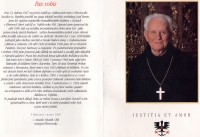Men in leather coats came in. They didn‘t lay a hand on us, but they were awfully mean
Stáhnout obrázek
Marie Tobolková, née Havlíčková, was born in Prague on 14 March 1940. Her parents came from the Klatovy region - her mother, Kamila, worked as a stenographer, and her father, Emanuel Havlíček, was a deputy for the People‘s Party. During the war, he became the head of the Benedictine estates of the Břevnov monastery. In May 1945, Marie and her brother stayed with relatives in Běšiny in the Klatovy region, where they experienced the liberation by the American army. After the war, she briefly attended the Břevnov scouts and met the Břevnov abbot Jan Anastáz Opasek through her father. She remembers February 1948 and the rise of the Communists to power. It meant the imprisonment of her aunt Emilia Zdráhalová in the 1950s and repression for the Benedictines with whom her father was in contact. The family found themselves targeted by State Security (StB), and the father was fired from his job. After high school, Marie graduated from the Faculty of Medicine at Charles University, majoring in paediatrics. She got a placement in Karlovy Vary, where she experienced the invasion of the occupation troops in August 1968. Although she came from a family of class enemies and never joined the Communist Party, she passed the examinations at the end of 1970 with the help of the Karlovy Vary senior doctor. In November 1989, she participated in several demonstrations in Karlovy Vary. After the revolution, she held the post of head of the children‘s ward in Karlovy Vary, later going into the private sector. She taught at a secondary medical school. She and her husband raised two children. In 2023, she lived in Karlovy Vary.
